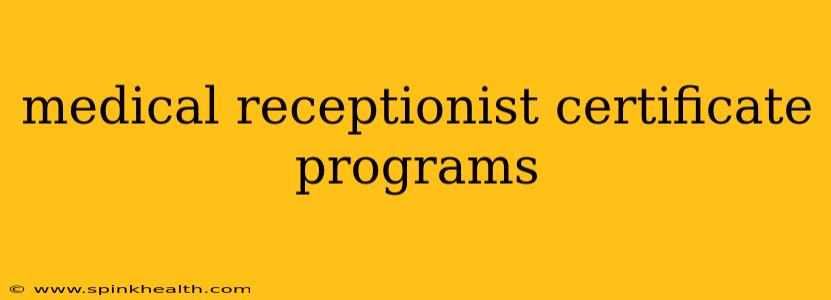The hum of the waiting room, the friendly greeting, the efficient scheduling – these are the hallmarks of a skilled medical receptionist. More than just answering phones, medical receptionists are the vital link between patients and healthcare providers, playing a critical role in the smooth functioning of any medical office. If you're considering a career in healthcare and enjoy interacting with people while managing details, a medical receptionist certificate program might be the perfect launchpad for you. Let's explore the possibilities.
My journey into the world of medical reception began unexpectedly. After years in retail, I felt a pull towards something more meaningful, a career where I could directly impact people's lives. The thought of working in a hospital seemed daunting, but the idea of a medical receptionist role – organizing, assisting, and providing a welcoming face – felt achievable and appealing. That's when I embarked on my own search for a suitable certificate program, a journey that led me to discover the wealth of options available and the rewarding career it offered. This post is based on my experience and extensive research, designed to help you navigate the world of medical receptionist certificate programs with confidence.
What Does a Medical Receptionist Do?
Before diving into the specifics of certificate programs, it's essential to understand the day-to-day responsibilities of a medical receptionist. This isn't just about answering phones; it's about managing a complex interplay of tasks that ensure the smooth running of a medical office. A typical day might involve:
- Scheduling appointments: Coordinating patient appointments, managing calendars, and ensuring efficient use of doctor's time.
- Handling patient inquiries: Answering phone calls, emails, and in-person inquiries, addressing patient concerns and providing information.
- Managing medical records: Maintaining accurate patient records, both physical and electronic, adhering to HIPAA regulations.
- Processing insurance claims: Understanding insurance procedures and assisting with billing and claims submission.
- Handling payments: Managing patient payments and maintaining financial records.
- Maintaining office supplies: Ensuring the office has adequate supplies and equipment.
- Greeting patients: Providing a warm and welcoming atmosphere for patients and visitors.
What are the Benefits of a Medical Receptionist Certificate Program?
Choosing a certificate program over other educational pathways offers several significant advantages:
- Faster Completion: Certificate programs are typically shorter and more focused than associate's or bachelor's degree programs, enabling quicker entry into the workforce.
- Targeted Skills: These programs provide targeted training in the specific skills needed for medical receptionist roles, making graduates immediately employable.
- Affordability: Certificate programs tend to be more affordable than longer degree programs.
- Career Advancement: A certificate can be a stepping stone to further education or advancement within the healthcare field.
What are the Different Types of Medical Receptionist Certificate Programs?
The landscape of medical receptionist certificate programs varies widely. Some are offered entirely online, others in traditional classroom settings, and many offer hybrid models. Consider these options when searching:
- Online Programs: Offer flexibility and accessibility for students with busy schedules or geographical limitations.
- On-Campus Programs: Provide hands-on training and direct interaction with instructors and classmates.
- Hybrid Programs: Blend online and in-person learning, providing flexibility while maintaining some of the benefits of traditional classroom settings.
How Long Does it Take to Complete a Medical Receptionist Certificate Program?
Program lengths vary. Some programs can be completed in as little as a few weeks, while others might take several months. Factors like the program's intensity and the number of credits required will influence the overall duration. Always check the program's curriculum and expected completion time before enrolling.
What Skills Will I Learn in a Medical Receptionist Certificate Program?
A well-structured program will equip you with a blend of technical and soft skills crucial for success in this role. Expect to develop proficiency in:
- Medical Terminology: Understanding and using medical terminology accurately.
- Medical Billing and Coding: Processing insurance claims and understanding billing procedures.
- Electronic Health Records (EHR) Software: Proficiency in using various EHR systems.
- Office Management Skills: Handling scheduling, filing, and other administrative tasks.
- Communication Skills: Effective communication with patients, doctors, and other staff members.
- Customer Service Skills: Providing excellent customer service in a fast-paced environment.
What are the Job Prospects After Completing a Medical Receptionist Certificate Program?
Graduates of medical receptionist certificate programs typically have strong job prospects. The demand for skilled medical receptionists remains consistent across various healthcare settings, including:
- Doctor's offices: A large portion of graduates find employment in this setting.
- Hospitals: Larger hospitals often require many medical receptionists.
- Clinics: Both private and public clinics present opportunities.
- Dental offices: Many dental offices also employ medical receptionists.
Where Can I Find Medical Receptionist Certificate Programs Near Me?
Finding a suitable program often starts with a simple online search. Use keywords like "medical receptionist certificate programs [your city/state]" to find local options. Check with community colleges, vocational schools, and online educational platforms. Always carefully review program accreditation and curriculum before enrolling.
My journey from retail to medical reception was fueled by a desire for a more fulfilling career. A certificate program provided the focused training I needed, enabling a swift and successful transition. The combination of technical skills and improved communication abilities opened doors I never thought possible. If you're seeking a rewarding career with a strong job outlook, a medical receptionist certificate program is worth exploring. Remember to research thoroughly, choosing a program that suits your learning style and career goals. Your future as a vital member of a healthcare team awaits!

